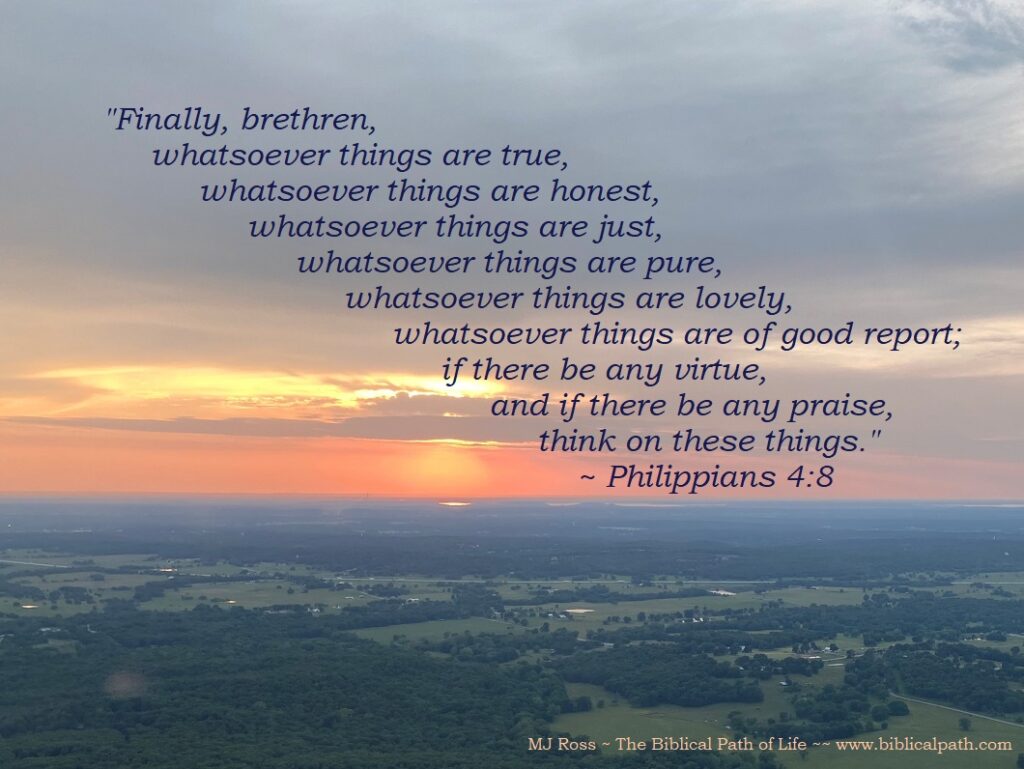
“Finally, brethren, whatsoever things are true, whatsoever things are honest, whatsoever things are just, whatsoever things are pure, whatsoever things are lovely, whatsoever things are of good report; if there be any virtue, and if there be any praise, think on these things.”
Philippians 4:8
If Christians find themselves in a place where they become discouraged with what is happening in the world around them, there are many encouraging things to be found in the Bible. Paul recorded many upon which we are to rely.
Paul called for Believers to “stand fast in the Lord”. He had already encouraged them to have the mind of Christ. He then gave a list of instructions they were to implement in their lives helping them become more Christ-like. Nevertheless, it was not always easy. One may want to just run and hide out away from the insanity that is often found in the world around one.
Yet Paul called them to action. “Therefore, my brethren dearly beloved and longed for, my joy and crown, so stand fast in the Lord, my dearly beloved” (Philippians 4:1). Read the following instructions Paul gave to help them live with the mind of Christ; things upon which to think. There are some definitions in brackets to help in the understanding of these verses.
Philippians 4:4-9:
- “4. Rejoice in the Lord alway: and again I say, Rejoice.
- 5. Let your moderation be known unto all men. The Lord is at hand. [Moderation means “clemency (means mercy; disposition to treat with favor and kindness; to forgive or spare; tenderness in punishing; opposed to severity; mildness of temper).”]
- 6. Be careful for nothing; but in every thing by prayer and supplication with thanksgiving let your requests be made known unto God. 7. And the peace of God, which passeth all understanding, shall keep your hearts and minds through Christ Jesus. [Careful means “to be anxious or troubled.” Supplication means “prayer for particular benefits; petition for oneself.” Keep means “to guard or preserve spiritually.”]
- 8. Finally, brethren, whatsoever things are true, [True means “true in conduct; upright; honest; just; sincere.”]
- whatsoever things are honest, [Honest means “venerable (being consecrated to God and to his worship); reputable; dignified.”]
- whatsoever things are just, [Just means “used of dispositions (inclination; propensity; the temper or frame of mind as directed to a particular object); judgments; things to indicate their right or conformable relation to justice or righteousness.”]
- whatsoever things are pure, [Pure means “innocent or blameless.”]
- whatsoever things are lovely, [Lovely means “dear to someone; beloved; things that are acceptable or pleasing.”]
- whatsoever things are of good report; [Good report means “well-spoken of; laudable; praiseworthy.”]
- if there be any virtue, and [Virtue means “human virtue as in moral excellence; perfection; goodness of action.”]
- if there be any praise, [Praise means “something praiseworthy.”]
- think on these things.
- 9. Those things, which ye have both learned, and received, and heard, and seen in me, do: and the God of peace shall be with you.”
Paul simply listed the things they must do in order to stand fast in their like-mindedness with Christ.
Not only did Paul teach what should be done, he was a living example: “which ye have both learned, and received, and heard, and seen in me, do”. Although we cannot see Paul today, we can read the example of his life. These words recorded in Philippians should bring great encouragement, and when implemented, enable Christians to have the mind of Christ. Christians should avoid the bad and negative, but dwell upon the good things that Paul described.
Have you been encouraged to take your eyes off of the world, thinking of the goodness God provides?

